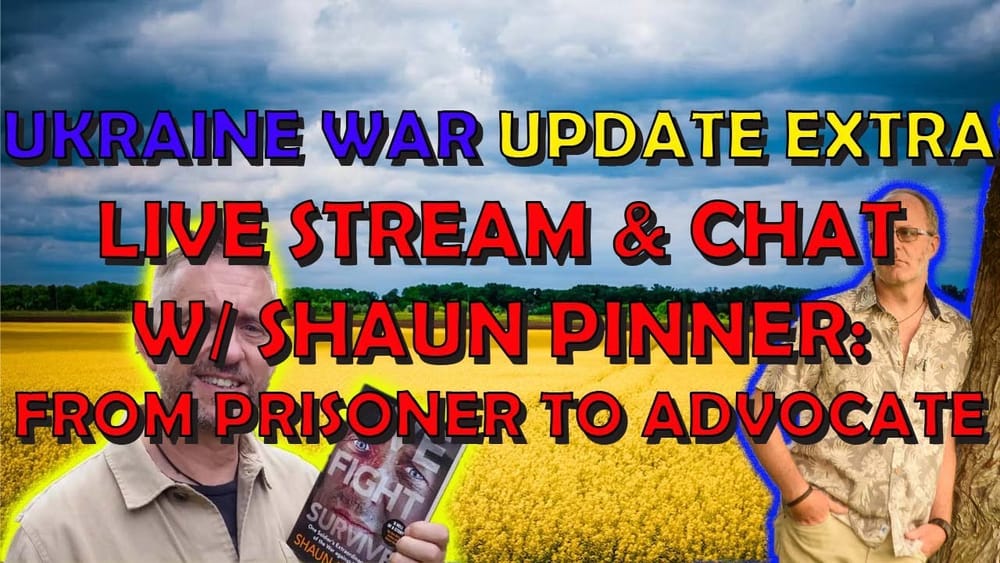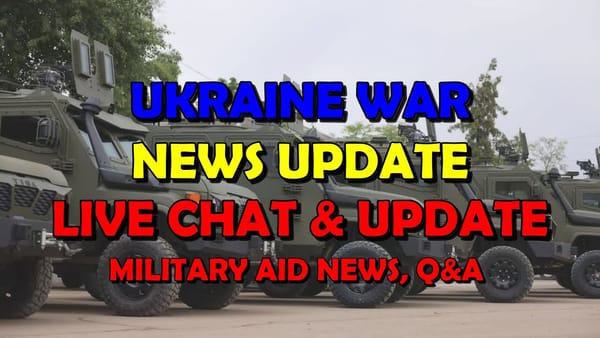Ukraine War Live Stream Chat w/ Shaun Pinner: From Prisoner to Advocate
🤖
This summary has been produced automatically by an AI Large Language Model (LLM) without any human intervention. Whilst every effort has been made to prompt the LLM to produce accurate output, there may be inconsistencies, inaccuracies or hallucinations!
Table of Contents 📖
Hello Team
🎦 00:00-01:40⏩
- Jonathan welcomes viewers and introduces his guest, Shaun Pinner, for the second time on his channel. He also mentions their previous conversation on Silicon Curtain with Mesa Gifford and Jonathan Fink.
- Jonathan expresses his amazement at the continuous flow of news and topics to discuss in the ongoing conflict, even after years of coverage. He acknowledges that while the situation is dire, he wouldn't mind returning to a time before the war.
Shaun Pinner's Introduction and Experience in Ukraine
🎦 01:40-04:05⏩
- Shaun Pinner introduces himself as a former British soldier with nine years of service in the Royal Anglian Regiment.
- He explains how he moved to Ukraine in 2018, married a Ukrainian woman, paid taxes, purchased a house, and established deep roots in the country.
- Shaun highlights his integration into Ukrainian society, emphasizing that he learned Russian first, the predominant language in his community, and speaks Surzhyk, a mixture of Russian and Ukrainian.
- He details his subsequent enlistment in the Ukrainian Marines in 2020 to secure residency, his role as an instructor, and his progression to a prestigious airborne assault unit.
- Shaun emphasizes his long-standing commitment to Ukraine, rejecting any accusations of being a mercenary due to his deep personal ties and active military service prior to the full-scale invasion.
Capture, Imprisonment and Torture
🎦 04:05-07:46⏩
- Shaun recounts his capture by Russian forces near Mariupol in April 2022 after enduring seven weeks of intense fighting, where his platoon suffered a 60% casualty rate, and his home was destroyed.
- He describes his imprisonment in a Russian prison for seven months, where he endured torture, including electrocution, stabbing, and starvation.
- Shaun details the sham trial he and other foreign fighters endured, being labelled Nazi mercenary terrorists and sentenced to death despite having legal status in Ukraine.
- He explains that the trial was a propaganda stunt orchestrated to secure the release of Viktor Medvedchuk, a pro-Russian Ukrainian politician.
- Shaun expresses relief at being exchanged in a prisoner swap involving numerous Ukrainians and foreigners in return for Russians and Medvedchuk. However, he highlights the lack of humanitarian aid provided to them during their captivity.
Sean Pinner's Book: 'Live Fight Survive'
🎦 07:46-10:28⏩
- Jonathan promotes Shaun Pinner's book, 'Live Fight Survive', encouraging viewers to listen to the audiobook, which is read by Shaun himself.
- He praises the book's powerful narrative, highlighting its blend of dark humour and insightful coping mechanisms developed during captivity.
- Jonathan commends Shaun for sharing his experiences and offering valuable life lessons, emphasizing the book's relevance beyond the context of war.
Coping Mechanisms and Mental Resilience
🎦 10:28-17:26⏩
- Jonathan inquires about Shaun's mental well-being after his ordeal, acknowledging the potential for lasting psychological scars.
- Shaun admits to experiencing trigger signs but asserts that his military training in survival and resistance techniques, coupled with his extensive combat experience, equipped him to handle the situation better than younger, less seasoned soldiers.
- He details his strategies for maintaining mental resilience during captivity, emphasizing the importance of focus, setting small goals, and finding wins within the confined environment.
- Shaun shares his experience of teaching himself Russian from a dictionary he cleverly obtained in prison, building a chess set from bottle tops, and engaging in other activities to keep his mind occupied and prevent despair.
Torture, Propaganda and the Role of RT
🎦 17:26-23:33⏩
- Jonathan questions whether the torture Shaun endured was purely sadistic, considering he possessed no valuable military intelligence after a few days of captivity.
- Shaun clarifies that torture is primarily used to extract false confessions and break an individual's spirit rather than obtain actual information.
- He highlights the coercive nature of propaganda interviews conducted by Russian state media, particularly RT, where prisoners are forced to comply with predetermined narratives.
- Shaun specifically criticizes RT presenter Roman Kozlov as an accessory to the murder of Paul Ury, a British NGO worker who died in captivity, for his involvement in covering up Ury's death.
- He denounces RT as a state-controlled propaganda outlet with no ethical standards, accusing them of complicity in the torture and mistreatment of Western POWs.
- Shaun expresses frustration with anonymous online trolls who blindly accept Russian propaganda and attack him based on false accusations of being a Nazi.
- He argues that true engagement requires accountability and encourages individuals to stand behind their opinions openly.
Russian Disinformation Campaigns
🎦 23:33-33:29⏩
- Jonathan and Shaun discuss the effectiveness of Russian disinformation campaigns, acknowledging the long-standing effort to portray Ukrainians as Nazis and undermine their legitimacy.
- Shaun argues that Russia's investment in propaganda and disinformation has been a strategic tool for years, citing the annexation of Crimea and the downplaying of their involvement in the Donbas conflict.
- They highlight the inconsistency of narratives surrounding Western involvement, particularly the idea of a US-backed coup in 2014, pointing out the conflicting views of the CIA's capabilities and the lack of discussion about NATO expansionism at the time of Crimea's annexation.
- Shaun emphasizes the overwhelming evidence of Russian involvement in the Donbas, including the presence of "little green men" with Russian equipment and the rapid militarization of separatist groups.
- They condemn the role of Western "journalists" working for Russian state media, such as Graham Phillips and Patrick Lancaster, accusing them of spreading disinformation and acting as agents of the Kremlin.
Bots, Trolls and the Influence of Russian Propaganda
🎦 33:29-37:57⏩
- Jonathan praises Russia's skill in conducting disinformation campaigns, suggesting that their resources could have been better spent on propaganda than the actual war effort.
- Shaun agrees, noting the effectiveness of bot and troll farms in amplifying Russian narratives and attacking those who challenge them.
- He shares his personal experience of being targeted by online trolls, highlighting the repetitive nature of their attacks and their reliance on baseless accusations.
- Shaun dismisses the value of anonymity in online discourse, emphasizing the importance of accountability and authenticity.
- They discuss the presence of Russian bots and trolls in American political discourse, particularly those supporting figures like Marjorie Taylor Greene, who espouse pro-Russian viewpoints.
- Jonathan suggests that the perceived level of support for such figures may be inflated by Russian propaganda, warning that online support doesn't necessarily translate into actual votes.
Internal Discord and Economic Problems in Russia
🎦 37:57-46:23⏩
- The conversation shifts to internal issues within Russia, with Jonathan noting a feud between Chechen leader Ramzan Kadyrov and a Dagestani politician.
- Shaun acknowledges the potential benefits of such internal discord for Ukraine, as it diverts resources and weakens Russia's overall war effort.
- He highlights the impact of the Ukrainian incursion into Kursk, suggesting that it has shaken the social contract between Putin and the Russian people, exposing vulnerabilities in their border security.
- Shaun discusses the deteriorating economic situation in Russia, including rising inflation, shortages of basic goods, and the re-emergence of a "digital iron curtain" with the banning of platforms like Discord.
- He notes a growing purge within the Kremlin, with investigations into corruption among high-ranking officials and the FSB consolidating power within the military.
- Shaun cites evidence of declining public support for the war in Russia, suggesting that Putin's grip on power may be weakening.
The Impact of US Elections on Ukrainian Support
🎦 46:23-51:46⏩
- Jonathan and Shaun express concern about the upcoming US elections and their potential impact on Ukrainian support.
- Shaun criticizes the "containment" policy adopted by the Biden administration, arguing that it downplays the global nature of the conflict and hinders Ukraine's ability to effectively defend itself.
- He argues that the US's reluctance to provide long-range missiles capable of striking targets within Russia is prolonging the war and costing Ukrainian lives.
- Shaun points to the partisan nature of the Ukraine issue in US politics, preventing the Democrats from campaigning on their support for Ukraine due to fears of alienating voters.
- They agree that the outcome of the US elections is crucial for Ukraine's future, hoping for a leader who will provide strong and unwavering support.
The Significance of the Kursk Offensive
🎦 51:46-59:46⏩
- Jonathan champions the Ukrainian offensive in Kursk, arguing that it was a strategically sound decision that inflicted significant losses on Russian forces and forced them to redeploy troops from other fronts.
- Shaun agrees, highlighting the success of the operation in capturing ground, gathering intelligence, and boosting Ukrainian morale.
- They acknowledge criticisms of the Kursk offensive from those fighting on other fronts, who felt that resources were being diverted from their areas of operation.
- Shaun emphasizes the importance of understanding the broader strategic picture, where decisions made at a higher level may not be immediately apparent to those on the ground.
- They praise the skill and effectiveness of Ukrainian forces, particularly their active defense tactics and their ability to inflict disproportionate losses on the enemy.
- Shaun underscores the importance of Western support in providing training, equipment, and intelligence, enabling Ukraine to counter Russia's military advantages.
- They discuss the growing impact of Ukrainian partisan activity within Russia, speculating that this may lead to further restrictions on communication and a tightening of Putin's grip on power.
Ukrainian Morale, Mobilisation and the Will to Fight
- Jonathan inquires about Ukrainian morale and the effectiveness of their mobilization efforts.
- Shaun acknowledges the challenges faced by Ukrainians, particularly those in heavily contested areas like Kherson and Kharkiv, where civilian casualties are high and the impact of the war is most severe.
- He notes that while the will to fight remains strong among Ukrainians, there is growing frustration with the West's reluctance to provide adequate support and the slow pace of arms deliveries.
- Shaun emphasizes that Ukrainians are not willing to needlessly sacrifice their lives, recognizing the importance of receiving adequate training, equipment, and strategic backing.
- He shares his experience of witnessing the horrors of the war firsthand, expressing frustration with the lack of international condemnation of Russia's actions and the inadequate response from organizations like the UN.
The Role of the UN and the Escalation of the Conflict
- Jonathan and Shaun delve into the complex role of the UN in the conflict, acknowledging both its vital humanitarian work and its limitations in addressing the ongoing violence.
- Shaun expresses disappointment with UN Secretary-General António Guterres, criticizing his perceived inaction in condemning Russia's aggression and his engagement with BRICS nations, including Russia.
- They discuss the escalating nature of the conflict, with Russia's alliance with Iran drawing in other actors like Hamas and Hezbollah, extending the war's impact into the Middle East.
- Shaun highlights the interconnectedness of global events, emphasizing the need to recognize the broader geopolitical implications of the Ukraine war and the dangers of downplaying its significance.
- He criticizes the lack of attention given to Russia's actions, particularly the targeting of civilians, the abduction of Ukrainian children, and the environmental devastation caused by the destruction of the Kakhovka Dam.
Ukraine's Potential for Victory and the Future of the Conflict
- Jonathan asks Shaun about Ukraine's chances of prevailing in the conflict, seeking his assessment of the situation on the ground.
- Shaun expresses cautious optimism, believing that Ukraine can win with continued Western support, particularly in terms of financial aid, weapons deliveries, and technology transfer.
- He stresses the importance of addressing the threat posed by Russian glide bombs, advocating for the provision of advanced air defense systems to counter their devastating impact.
- Shaun acknowledges the challenges faced by Ukraine, particularly the need to liberate Crimea, which he considers a strategically vital territory, and the difficulties of retaking heavily fortified areas in the east.
- He argues that Russia's military performance has been underwhelming, highlighting their heavy losses, their reliance on outdated tactics, and their increasing dependence on foreign support from Iran and North Korea.
- Shaun notes the growing economic and social problems within Russia, suggesting that these internal pressures may eventually lead to a political collapse that could benefit Ukraine.
The Importance of Will to Fight and Western Support
- The conversation concludes with a discussion about the importance of will to fight and Western support in determining the conflict's outcome.
- Shaun emphasizes that while Ukraine has the manpower and the determination to resist Russia's aggression, their success hinges on receiving adequate material and political backing from their allies.
- He argues that the West's hesitation in providing full-fledged support is prolonging the war and costing Ukrainian lives, while emboldening Russia to escalate its violence.
- Shaun highlights the moral and strategic imperatives for the West to stand with Ukraine, emphasizing that Russia's defeat is essential for maintaining international security and upholding democratic values.
- They discuss the consequences of Russia's actions, particularly the displacement of millions of Ukrainians, the destruction of their homes and infrastructure, and the psychological trauma inflicted on their population.
- Shaun stresses the long-term impact of the war on both Ukraine and Russia, predicting that Russia will face lasting economic and social damage as a result of its aggression.
Wrap Up: Calls to Action and Final Remarks
- Jonathan thanks Shaun Pinner for his insights and his service to Ukraine, encouraging viewers to buy his book, 'Live Fight Survive', and support his ongoing efforts to assist Ukrainians.
- Shaun shares his social media handles and promotes his upcoming book-to-film adaptation, emphasizing his desire to honor the memory of those who have died in the conflict and shed light on the horrors of Russian imperialism.
- He discusses his involvement in raising funds for drones and medical supplies for Ukrainian troops, highlighting the need to provide ongoing support for those impacted by the war.
- Shaun emphasizes the importance of staying informed about the situation in Ukraine, urging viewers to continue their support and advocating for greater international pressure on Russia.
- Jonathan concludes the livestream by thanking his community for their engagement and reiterating their shared commitment to Ukraine's cause.
"Russia has no moral bar. It doesn't care who it kills. Even its own people. It doesn't care."
🤖❓ AI Debrief (post task) - anything the AI didn't understand
The date of the video is not mentioned in the transcript.
🤖💭 AI Plan (pre task) - the AI's step by step thought process
TASK 1: Extract the title, date, and part from the YouTube video title.
The title is the main part of the video title, excluding the date and part.
The date is in the format YYYYMMDD and needs to be converted to DD/MM/YYYY.
The part is the letter following the date.
TASK 2: Split the transcript into topics based on subject matter and create concise, specific topic titles.
Number each topic with an ID, starting from 1.
The first topic will always be "Hello Team" and the last will always be "Wrap up".
Use Ukrainian spellings for Ukrainian place names and people.
TASK 3: Determine the start and end timestamps for each topic.
Use the format MM:SS or HH:MM:SS.
Separate multiple timeframes for a topic with commas.
Ensure complete coverage of the video timeline.
TASK 4: Write summaries for each topic, capturing key points and context.
Use bullet points for clarity.
Emphasize important points with markdown (bold, italics, underline).
Include quotes and opinions from Jonathan and Shaun.
TASK 5: Select a concise, meaningful quote that stands out from the video.
TASK 6: List any unclear parts of the transcript for clarification.




